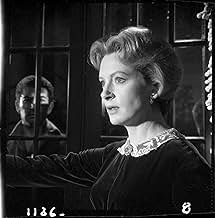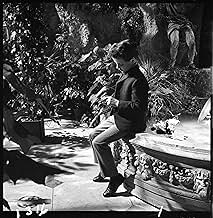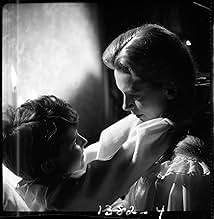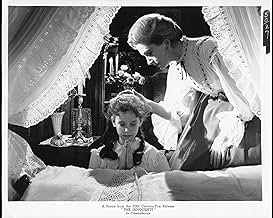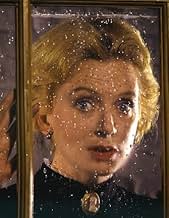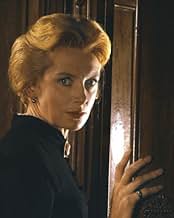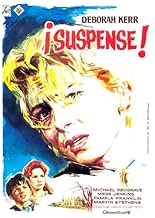La jeune gouvernante de deux enfants est convaincue que leur maison est hantée.La jeune gouvernante de deux enfants est convaincue que leur maison est hantée.La jeune gouvernante de deux enfants est convaincue que leur maison est hantée.
- Réalisation
- Scénario
- Casting principal
- Nomination aux 2 BAFTA Awards
- 4 victoires et 5 nominations au total
Avis à la une
Deborah Kerr accepts a job as the governess of two strange children (Martin Stephens and Pamela Franklin) and becomes convinced that they occupy a world haunted by repressed memories and the restless dead.
Martin Stephens' performance as the unfathomable Miles is extraordinary. The child projects a physical authority rare for his years. His dialog exchanges with Kerr run the gamut from highly amusing to deeply disturbing.
Clayton's greatest achievement is the way he subverts common household settings to the point where they become arenas of fear.
The sound design is chilling, conjuring sudden terror and thrusting us into the complex mechanics of the Kerr character's growing paranoia.
Strikingly shot and lit, the film is a textbook example of grave cinematic suggestion.
Watching the movie, I could see some similarities to "The Shining" and "The Others". It just goes to show that real horror comes not from blood and guts, but from what the viewer doesn't know. There were a few scenes in this movie that made my blood freeze a little bit. Without a doubt it was a solid achievement for Clayton, Kerr, and also Truman Capote (who co-wrote the screenplay). Definitely one that I recommend.
This dark and atmospheric tale is a wonderful example of how to create an admirable horror movie that, although has violent undertones, features very little violence when all is said and done. The Innocents' is certainly a psychological horror movie which leaves in doubt how much of the inexplicable happenings are supernatural, and how much is in the mind of the protagonist, Miss Giddens. Director Jack Clayton uses some astonishing visual trickery and ghostly effects to create and maintain a very unsettling atmosphere, almost from the very beginning. A number of effective ghostly apparitions are displayed on screen during the movie from varying distances which gives The Innocents' a constant, foreboding atmosphere. The way some scene changes blend with the end of the previous scene are rather disconcerting and almost dream like as there are long lingering images, once again, wholly adding to the effect. Some of the dialogue may seem a little unrealistic, but in general the movie is well scripted and features a few very dramatic scenes thanks to some delightfully written dialogue and strong acting performances. William Archibald and Truman Capote both won awards for their script writing.
The only real fault with The Innocents' is how fast the film moves along. Miss Giddens seems to realise the truth of what is happening all too quickly. This does not make The Innocents' less enjoyable, but it would have been nice to have had an extra ten minutes or so explaining the story to us a bit more. The Innocents' has a sustained tone of dread throughout the movie. It seems that Miss Giddens is unable to move without being confronted by some spectre or seeing some rather peculiar behaviour exhibited from the children. I'd compare the dark atmosphere with that of The Haunting' (1963), both movies are comparable in the way they are presented and are both aesthetically pleasing. The acting was of a high standard, though one must forgive the two young performers if they occasionally seemed to overact. Martin Stephens was very good as Miles, playing his sinister part with an awful power, even though the character's superciliousness became somewhat of an annoyance. Megs Jenkins was also delightful as the anxious housekeeper Mrs. Grose. From the moment Mrs. Grose is first introduced the viewer can begin to suspect something. Jenkins came across as a friendly, but scared, woman who is desperate to maintain decorum in the house. A fine performance suited her character marvellously. One must also mention Deborah Kerr's fine performance as Miss Giddens as she played it with the right balance of inquisitiveness and fear. Deborah's dramatic performance certainly helped make this movie fantastic and one sympathises with her deeply as the film ends on the sombre and heartbreaking note that it does.
The Innocents' is an elegant and stylish movie that is certainly worth watching. Fans of The Omen' and Village of the Damned' should enjoy this as well as any fan of dark, atmospheric horror. A strong screenplay, fine performances and breathtaking visual trickery make this movie a very pleasing addition to the horror genre and I highly recommend it to all. The Innocents' was able to scoop a BAFTA Award (British Academy of Film and Television Awards) for Best British Film as well as a BAFTA nomination for Jack Clayton which he thoroughly deserved. My rating for The Innocents' - 8/10.
Everything about this movie is haunting. First, there's the song at the beginning: you hear a young girl's voice singing a beautiful yet somber song. Later you hear that song in several scenes in the movie.
Second, there's the setting: this movie takes place in a large Victorian mansion with many rooms and passages, while only about eight people live in it....what could be more eerie than that?
Then there's the exceptional cinematography. The black-and-white photography is perfect for this movie. This movie would not have been too creepy if it had been done in color. Further, many of the shots were innovative and the lighting was used ingeniously in some of the scenes.
Additionally, I liked the way that the director chose to play around with the sound, which brought more of an element of mystery to the movie. In one particular scene, there was a lot of noise initially....and in a split second there was dead silence....then several seconds later, it was noisy all over again (all in the same scene).
But what I think is the most interesting thing about this movie is the fantastic performance by Deborah Kerr. It's fascinating to watch her facial expressions in this movie. She demonstrates her character's fear quite well.
I also think that the actor who plays Quint is very scary-looking! He has a very sinister look, and it adds to the spookiness of this movie. If you really want to be spooked by this movie, watch it late at night with all of the lights off....dare to watch it by yourself.
Based on Henry James' novella, "The Turn Of The Screw," the story is deceptively simple. An inexperienced governess is hired to care for two orphaned children in an isolated British manor and slowly comes to believe the ghosts of the previous governess and her brutish lover are trying to possess the children's souls. Being a decent woman "who loves children," she fights back the only way she can -- by confronting the evil head on. But the question is, does the evil truly exist...or is it all in her own mind?
As told by James, the novella is a startling ghost story, without question. He adds his usual psychological insights to the characters, but never do you doubt the ghosts exist. The defining moment comes when Miss Giddens sees Quint's face in a dark window then later finds a locket bearing his portrait and comes to her realization, "Oh, he's a ghost!" But in the movie, Truman Capote and William Archibald reverse this sequence -- she finds the locket first and THEN sees the man's face in the window -- and all simple explanations go out the door.
Is Miss Giddens imagining things? Has she become overwhelmed by the responsibility of raising two precocious children without any sort of support from their selfish uncle? Is she merely sexually repressed and immature enough to transfer her crush on the uncle to a boy not even into puberty yet? And what of Flora, Miles' sister? If this is merely sexual repression on Miss Giddens' part, then why does she drag a little girl into the morass? Throughout the film, Miss Giddens offers evidence of her concerns -- a letter received from Miles' schoolmaster that she cannot fully share with Mrs. Grose because the woman cannot read; her awareness that the two innocents in her charge have a far more advanced knowledge of life than children that age normally would; stories told by Mrs. Grose about Miss Jessel and Quint and how they treated the children. So could it be the spirits of two miserable adults have come back to reclaim life in the persons of Miles and Flora? It could go either way.
There is not one wrong moment in this movie. Not one. The first time I saw it was in New York City on a double bill with "The Haunting" (1963), a "things that go bump in the night" kind of movie. The audience and I howled through that one, it was so much silly fun. And we chuckled through the first ten minutes of "The Innocents" (especially when Mrs. Grose tells Miss Giddens, "I'm SO glad you're here," with a little quiver in her voice), but by the end of that film (and I use the word "film" deliberately), the entire theater was dead silent. Any film that can shut up a room full of rowdy New Yorkers has got to be damned good.
So...is "The Innocents" a ghost story or psychological study? Who can say? And to be honest, who cares? It is, at the very least, a damned good movie...and at the very best, a horror story that makes "The Shining," "Rosemary's Baby," "The Others" and even "Psycho" (a movie I love) look like the works of children. That this film is not available on DVD is a travesty.
Le saviez-vous
- AnecdotesTo create such sharp visuals, director of photography Freddie Francis used lots of huge bright lamps. Deborah Kerr sometimes had to resort to wearing sunglasses between takes. He also had candles custom made with four or five wicks entwined to produce more light.
- GaffesAn obvious center back zipper in several of Miss Kerr's costumes, as well as in Mrs. Gross & Flora's costumes. The Innocents is set during the Victorian period, 1837-1901. Commercial zippers were not used in clothing until 1925.
- Citations
Miles: What shall I sing to my lord from my window? What shall I sing for my lord will not stay? What shall I sing for my lord will not listen? Where shall I go when my lord is away? Whom shall I love when the moon is arisen? Gone is my lord and the grave is his prison. What shall I say when my lord comes a calling? What shall I say when he knocks on my door? What shall I say when his feet enter softly? Leaving the marks of his grave on my floor. Enter my lord. Come from your prison. Come from your grave, for the moon is a risen. Welcome, my lord.
- Crédits fousThe film begins with a totally black screen and the sound of Flora singing for several seconds; then the 20th Century Fox logo fades in and out. The singing continues for a few seconds before the opening credits begin. As the credits display, we see an anguished Miss Giddens praying on the left side of the screen. Her actions are not explained until the film's climax.
- ConnexionsFeatured in Aweful Movies with Deadly Earnest: The Innocents (1974)
Meilleurs choix
Détails
- Date de sortie
- Pays d’origine
- Langue
- Aussi connu sous le nom de
- Posesión satánica
- Lieux de tournage
- Société de production
- Voir plus de crédits d'entreprise sur IMDbPro
Box-office
- Budget
- 430 000 £GB (estimé)
- Montant brut mondial
- 30 411 $US
- Durée
- 1h 40min(100 min)
- Couleur
- Rapport de forme
- 2.35 : 1



